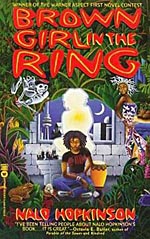
![]() Sable Aradia
Sable Aradia
9/5/2016
![]()
Read for the Women of Genre Fiction challenge, the 12 Awards in 12 Months challenge, the LGBTQ Speculative Fiction challengeand the Vernon Library Summer Reading challenge. I was going to read this for the Apocalypse Now! Challenge, but the world was not destroyed and therefore, it does not qualify.
I loved this book. I loved everything about it! I have encountered some of Nalo Hopkinson's short fiction before and was intrigued, but this novel received a lot of awards and a lot of critical acclaim, and was her first explosion on the scene. One of those awards was the Aurora Award, which is Canada's tribute to our science fiction and fantasy writers, so naturally I was honour-bound to read it eventually anyway, but what a pleasure!
In this novel of magical realism, which takes place in a dystopian Toronto that has been abandoned by the Canadian and Ontario governments after an economic collapse, Ti-Jeanne has just recently left the father of her baby to live with her grandmother because he is a drug addict who has gotten mixed up with the local organized crime syndicate who runs the inner city, called the Posse, and she realizes that as much as she loves him, he's no good for her and less good for the baby. There is no police force in operation in the urban remains, none of the city's infrastructure is supported, and economy has gone back to bartering and growing what one can in the remains of the city's many iconic parks, so there is little consequence for participating in crime and the Posse has a free rein in the city. The leader of the Posse, Rudy, has made a deal with a shady hospital to provide a human heart for a transplant to the Premier of the Province (for you Americans, that's like the state governor.) Rudy has learned that Tony, the father of Ti-Jeanne's baby, has been skimming off the top of the drugs he has been selling for Rudy to support his own habit, and has blackmailed him into fetching the heart from one of the local urban residents--by force. Tony was once a nurse before his habit got him fired.
What makes this scenario really interesting is that Ti-Jeanne's grandmother, Gros-Jeanne (yes, for those of you who speak French, the names are deliberately symbolic) is a Caribbean immigrant who is a priestess of a Caribbean Afro-Diasporic tradition. The Afro-Diasporic traditions are syncretic faiths such as Voodoo and Santeria; Gros-Jeanne never specifies her tradition and actually says that they are all essentially the same. This turns the sordid scenario into an epic spirit quest in the Caribbean spiritual tradition, taking place partially in the physical world and partially in the spirit world. Much of the magic, until near the end of the book, might only be happening in the minds of the characters, and best of all, the Voodoo is real. I am a Wiccan priestess and have had the opportunity to learn just enough about Voodoo from practitioners that I have met to recognize the rituals, the symbolism, the magical practices and the spirits themselves.
The overall effect is an exercise in surrealism, told with a masterful hand. The language is simple but the characters and the story are deep. I don't dare tell you anymore for risk of spoiling the story. I will say that I loved everything about it, from the story itself, to the mythic themes of Caribbean culture that were mined to create the story structure, to the evocative descriptions, to the use of modern iconic places to create a sense of realism, to the theme, which, ultimately, is a complex examination of what "family" actually is. I find myself beaming with Canadian pride in Nalo Hopkinson, and I highly recommend this novel to pretty much anyone.